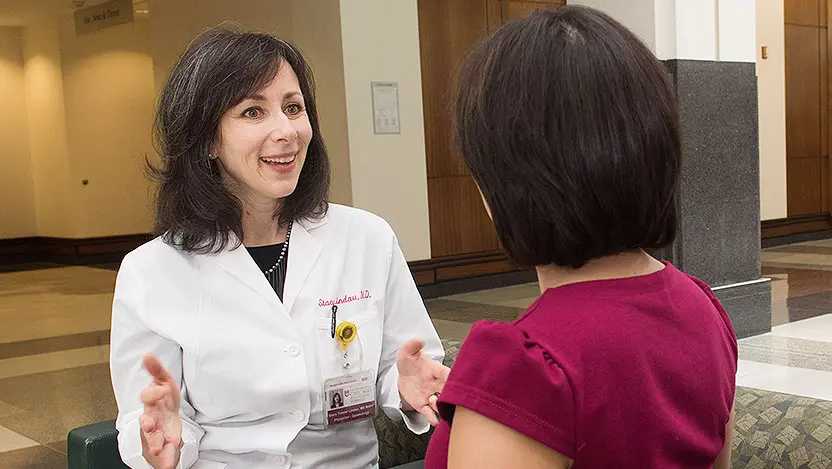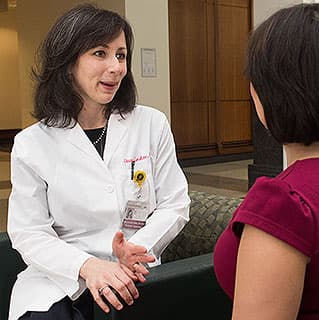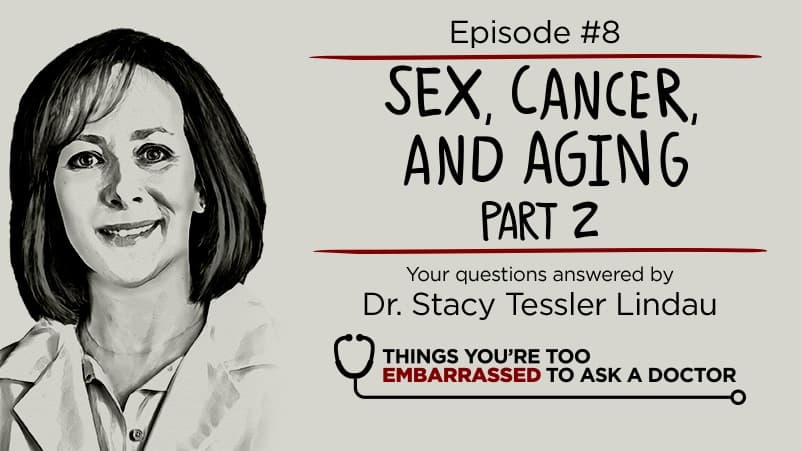Vyleesi? Addyi? How women can get help for low sexual desire

The U.S. Food and Drug Administration just approved bremelanotide as a new pharmaceutical treatment for pre-menopausal women with low libido. Marketed under the brand name Vyleesi, the injectable medication is used to treat what has been known as hypoactive sexual desire disorder (HSDD). It’s the second libido-enhancing medication on the market for women. (The first, Addyi, was approved in 2015 and is a once-a-day pill designed to increase sexual desire.)
Statistics vary, but more than a third of women report having low or limited libido and 10 percent have HSDD. Many — but, it’s important to note, not all — are looking for help to increase their sex drive.
We spoke with Stacy Tessler Lindau, MD, MA, a professor in the Department of Obstetrics and Gynecology and an expert in sexual function who runs the University of Chicago Medicine’s Program in Integrative Sexual Medicine and WomanLab.org, to learn more about what this latest pharmaceutical option means for women.
Q: When should women talk to their doctor about low sex drive?
A: A woman who is bothered or distressed about low sex drive should raise the concern with a doctor. Some women do have lower sex drive than they used to or they would describe themselves as always having lower sex drive than their partner, but they see no problem. In fact, if you are satisfied with the level of your sex drive, then you don’t need a doctor’s help. Some women have situational low sex drive — meaning they find themselves feeling desire or having sexual thoughts in some situations but they do not feel a desire for or interest in their current partner. They may be struggling with the quality of the relationship or the partner may be unwell. In this situation, the first stop might be to consult a certified sex therapist or couples therapist. The website www.womanlab.org.
Q: When does a low libido qualify as hypoactive sexual desire disorder (HSDD)?
A: The term “hypoactive sexual desire disorder” is a technical term used in an important and evolving scientific document called the Diagnostic and Statistical Manual (DSM). In the DSM-IV-TR, the term was used to define the features required for a clinical diagnosis of a sexual dysfunction that included deficient or absent sexual fantasies and desire for sexual activity. The term was also used in drug studies to determine who is eligible to participate in a study and to track outcomes, like the degree to which the drug works to address the condition. In 2013, with the publication of the DSM-V, the term was retired and replaced with a new, merged term: “female sexual interest/arousal disorder.” Low libido is one symptom or feature required to qualify for this disorder.
Q: What are some of the treatment options available for women with HSDD?
A: Treatment options for low libido problems in women depend on the cause of the problem. New onset of low libido can be a symptom of an underlying physical or mental health problem. A drop in libido can be related to a life stage or event like pregnancy, post-partum, or grief due to a loss. A woman might find that her libido is heavily influenced by her partner’s interest in or drive for sex, so an evaluation should include the partner’s health and sexual function. Certainly, treatments that interfere with sex hormone metabolism like anti-hormone therapies used for breast cancer or infertility or even uterine fibroids can have a very substantial effect on a woman’s libido, as can medicines used to treat mood disorders like depression and anxiety. Chronic poor quality sleep, including disruption resulting from a baby’s or a partner’s sleep issues, is a common correctable cause of low libido. Painful sex, often due in part to vaginal dryness, is a common cause of low libido — once the pain is treated, libido often improves. Vaginal dryness is commonly due to menopause, tightness in the pelvic floor muscles, too much washing in the genital area, lack of sufficient foreplay or sexual arousal, and dermatologic or other medical conditions. Treatment depends on the cause and the cause is often multifactorial. Many women with a low libido concern benefit from a combined body, mind and relationship approach. Pelvic floor physical therapy can be a very helpful modality for women with decrease in libido due to pain and tightness around the opening of the vagina (a common and correctable condition called vaginismus).
Q: Why is it important to have pharmaceuticals available for women with HSDD?
A: Most libido problems can be addressed without medication and, even with newly approved treatments for low libido in women, there is typically no quick fix. My bias as a physician is to use medication as a treatment of last resort — medication is costly, it can have side effects, it can interact negatively with other medication and it rarely addresses the root cause of the problem. And, I’m also a believer that the more safe and effective options we have to help alleviate human suffering, the better. There are safe and effective treatments for male sexual function problems that have extended sexually active life and quality of life for millions of men and their partners. Of course, we should expect the same for women and their partners.
Q: Addyi and Vyleesi work differently. Are there things women and their physicians should consider when weighing one medication over another for women?
A: Flibanserin (marketed in the U.S. as Addyi) is taken as an oral pill and must be taken daily for effect, which is shown to be minimal compared to placebo. The more worrisome side effects may include sleepiness and fainting as well as negative interactions with alcohol and other prescription medications commonly used by sexually active women. Bremelanotide (marketed in the U.S. as Vyleesi) is taken about 45 minutes before a sexual encounter and is self-administered as an injection in the thigh or abdomen. The best available evidence, which is limited, also shows minimal effect on the main outcome — number of satisfying sexual events — for women as compared to placebo. Nausea is a common side effect, which seems counter-productive. If you ask a nauseated woman if she is having sexual thoughts or fantasies or if she is interested in having sex in the next 45 minutes, there is a high likelihood she would say no.
Q: Viagra and other drugs have been on the market for years to help men with sexual performance/health/function, but there’s been limited options for women. How important is this FDA approval for women's sexual health?
A: Many women (and men) use substances like alcohol and marijuana (or related products) to address libido and related sexual dysfunction problems. Safe sex requires consent, so using substances to treat sexual function problems that can impair judgment or diminish a person’s agency over her body is worrisome and adds risk for both partners. FDA approval of treatments for female sexual function should avail women of treatments that meet rigorous standards for safety and effectiveness and should protect women from risks associated with unregulated, unsupervised, unproven treatments that could be a waste of their money at best and harmful at worst.
Q: Both Addyi and Vyleesi have been incorrectly called "the female Viagra" by a lot of news outlets. Why is that terminology so wrong?
A: Viagra and other popular erectile dysfunction drugs like it help men with what amounts to a plumbing problem that limits their ability to get and maintain an erection. Women can get erections too. You see that when blood flows to their nipples and their clitoris during arousal. Neither Addyi nor Vyleesi target this female physiology. Instead, the medications are designed to increase sex drive. Vyleesi activates melanocortin receptors, Addyi targets serotonin receptors, but we still don’t have a full understanding of how these medications affect women's sexual desire. For both drugs, the effect is modest at best — these are not magic wands for libido. It’s wrong and confusing to call these drugs "female Viagra." Doctors, women and the public at large are less informed about female sexual function than we all should be. In women and men, sexual function includes libido or interest in sex, sexual arousal (including erection) and orgasm. It would be great if we could find a single treatment to address all aspects of function, but we don’t have one yet.
For an ongoing stream of science-driven information about libido and other female sexual function topics, follow WomanLab: The University of Chicago's Program in Integrative Sexual Medicine for Women and Girls with Cancer (PRISM Clinic) is designed to identify, prevent and treat sexual health problems in female cancer patients and survivors.
Program in Integrative Sexual Medicine (PRISM) for Women and Girls with Cancer

